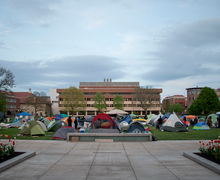How SU can join rest of Syracuse community in helping Afghan refugees
Corey Henry | Senior Staff Photographer
The United States military withdrawal from Afghanistan and the Taliban takeover have displaced hundreds of thousands of Afghan people. Even though the current media cycle has shifted its spotlight onto new issues, there are still thousands of people looking for asylum.
InterFaith Works of Central New York’s president and CEO Beth Broadway described the history of refugees relocating to Onondaga County. “The (Afghan) refugees are certainly upfront and in the news right now, but … refugees are coming from many different places and we have been consistently settling refugees for 40 years,” she said.
With 123,000 Afghan civilians seeking asylum, paired with U.S bureaucracy, one can imagine the process of relocation is a long and exhausting journey.
The good news is that with Biden’s reversal of Trump’s immigration policies, it is easier for more people to enter the country. Under the Trump administration only about 15,000 refugees were permitted to resettle in the country. This further complicated the entire process, but Biden raised the refugee admissions cap to 62,500.
While the refugee resettlement process has been improved, it doesn’t end when refugees enter the United States. Trapped in a state of limbo between countries, refugees are subjugated to various intensive background screenings, health procedures and other documentation requirements.
Since the United States’ withdrawal from Afghanistan, the Syracuse community has really stepped up. Syracuse locals have been preparing for the influx of refugees in a number of ways — mostly by raising money, gathering supplies and even offering up extra houses or rooms for refugees to move into. InterFaith Works expects to welcome around 200 Afghani refugees into the Syracuse community in the upcoming weeks.
A healthy portion of the incoming refugees have qualifications and degrees that either don’t carry over to the United States, or they left in such a hurry that they didn’t get the opportunity to grab their documentation. The university could offer programs to expedite the education process for refugees in these scenarios so they can enter the workforce in skilled professions.
The school could also provide assistance for those who have not had the opportunity to get an education — even if it is just English classes or any useful curriculum that would ease their acclimation process. InterFaith Works is looking for students who “care about this issue or want to lend a hand” and “are happy to use the community’s support,” Broadway said. Students have ample opportunities to step up as well. InterFaith Works is always looking for student organizations to help raise money and gather needed supplies, such as food native to the Afghan diet and winter coats, as well as help refurbishing houses and apartments to make them more homey.
We can see how quickly the news cycle can advance onto the next topic, leaving important issues like refugee resettlement out of our forethoughts. Every year, millions of people leave everything behind to flee persecution, war and natural disaster. For those who resettle in the United States, the journey to get here is a long one and doesn’t end when one officially gets their U.S. passport. Acclimation and adjusting to U.S. norms is no easy task, and having people who surround you in support can make a world’s difference. I urge you to reach out to Daryl Files [email protected] with InterFaith Works of Central New York to see how you or your organization can help.
Nick Held is a sophomore undecided arts and sciences major. His column appears biweekly. He can be reached at [email protected].

Published on September 13, 2021 at 9:43 pm




